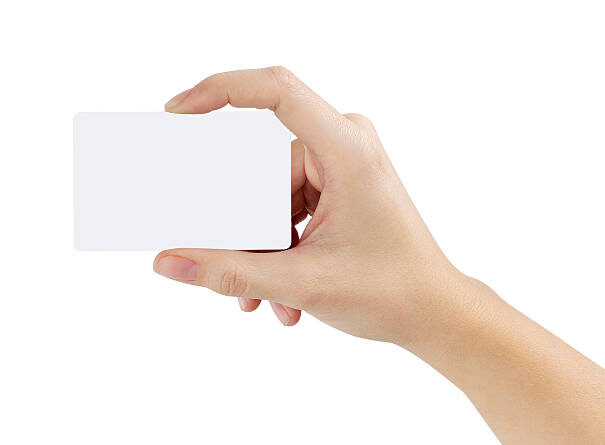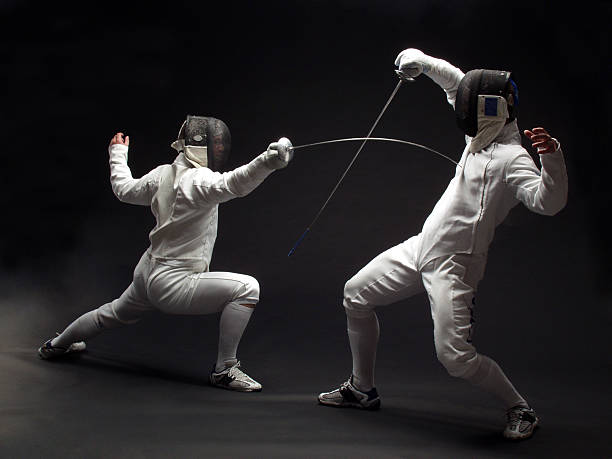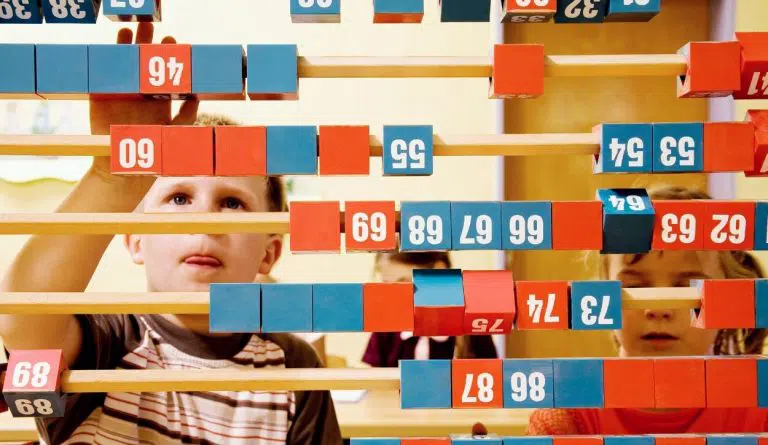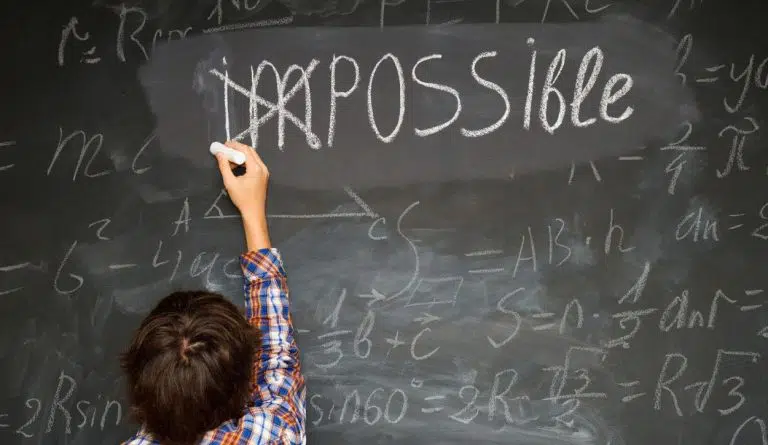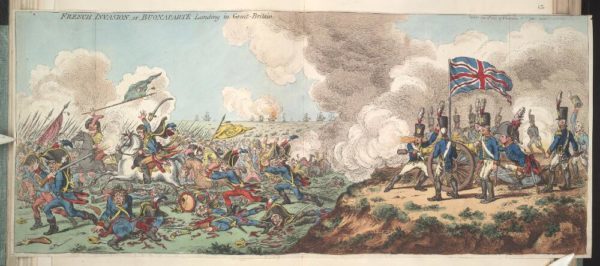You’re probably aware that we regularly use plenty of French words in English.
But did you know that English is so close to the French language, that around 30% of English words come from the language of love?
Some of these French phrases in English (otherwise known as cognates!) are borrowed directly from the French language, while others have evolved from French origins.
We’ve put together some responses to some of the most common questions about the French presence in the English language for you, plus 99 examples of how English words didn’t fall too far from the French tree.
Everything you’ve ever wanted, right?
Why are there French words in the English language?
The origin of the English language is a topic linguists love to debate.
Although English is a Germanic language, it shares a lot of vocabulary with French – a Romance language.
But why?
The Norman Conquest of 1066 was a key event that led to French words being used in England.
Following the conquest, England was ruled by the Normans who spoke a northern form of Old French called Anglo-Norman French.
Under Norman rule, Anglo-Norman French began to influence the language of administration, law and culture in England, and hence making its mark on the English language.
Since then, French phrases and words – funny quirks and all – continued to make their way into the English language.
And French isn’t the only language that has made its mark on the English language. There are plenty of Spanish words in English, and a good handful of Japanese words in English, too.
How many French words are there in English?
There exists around 7,000 French words in the English language at present.
Believe it or not, though, there were plenty more English words that came from French (and typically Latin) roots originally – around 10,000, to be exact.
Do any examples come to mind? At this point, I’m sure you’re desperate to see some examples of English words with French origins…
Let’s start with 99 (we thought any more might be a bit much!).
Here are 99 common French words used in English, and their meaning
- Allowance – from the Old French word alouance (payment)
- Apostrophe – from the French word apostrophe
- Attaché – from the French word attaché (attached)
- Apéritif – from the French word apéritif
- Avant-garde – from the French word avant-garde
- Aviation – from the French word aviation
- Bachelor – from the Anglo-Norman word bacheler (bachelier in modern French)
- Baguette – from the French word baguette (stick)
- Ballet – from the French word ballet
- Beret – from the French word béret
- Bon voyage – from the French phrase bon voyage (have a good journey)
- Brunette – from the French word brunette
- Bureau – from the French word bureau (desk, office)
- Cabaret – from the French word cabaret
- Cadet – from the French word cadet
- Champagne – from the French word champagne
- Chauffeur – from the French word chauffeur
- Chic – from the French word chic (elegant)
- Cliché – from the French word cliché
- Connoisseur – from the French word connoisseur
- Cul-de-sac – from the French word cul-de-sac (bottom of the bag/sack)
- Debris – from the French word débris (broken, crumbled)
- Déjà vu – from the French words déjà (already) and vu (seen – past participle of ‘voir’)
- Delegate – from the Old French word delegat
- Detour – from the French word détour (from détourner)
- Dossier – from the French word dossier
- Eau de toilette – from the French word eau de toilette
- Elite – from the Old French word elit (chosen)
- Energy – from the Middle French word énergie
- En route – from the French en route
- Envisage – from the French word envisager
- Expatriate – from the French word expatrier
- Facade – from the French word façade
- Faux, as in faux fur – from the French word faux (false)
- Faux-pas – from the French word faux pas
- Fiancé – from the French word fiancé
- Film noir – from the French word film noir (a film genre)
- Gallery – from the Old French word galerie
- Gastronomy – from the French word gastronomie
- Gateau – from the French word gâteau
- Gazette – from the French word gazette
- Heritage – from the Old French word eritage (héritage in modern French)
- Homage – from the Old French word homage
- Hotel – from the French word hôtel
- Identity – from the Middle French word identité
- Illusion – from the Old French word illusion
- Insult – from the Middle French words insult (noun) and insulter (verb)
- Irony – from the Middle French word ironie
- Jubilee – from the Middle French word jubile (modern French jubilé)
- Kilogram – from the French word kilogramme
- Lacrosse – from the Canadian French word la crosse (the stick)
- Laissez-faire – from the French word laissez-faire (leave things to take their course)
- Liaison – from the French word liaison
- Literature – from the Old French word littérature
- Machine – from the Middle French word machine
- Magnificent – from the Middle French word magnificent
- Maisonette – from the French word maisonette
- Massage – from the French word massage
- Menu – from the French word menu
- Metabolism – from the French word métabolisme
- Metro – from the French word métro
- Musketeer – from the French word mousquetaire
- Navy – from the Old French word navie
- Neutral – from the Middle French word neutral
- Nocturnal – from the Middle French word nocturnal
- Novel – from the Old French word novel
- Occasion – from the Middle French word occasion
- Omelette – from the French word omelette
- Optimism – from the French word optimisme
- Papier-mâché – from the French word papier-mâché
- Parasol – from the French word parasol
- Poetic – from the Middle French word poétique
- Premiere – from the French word première
- Purify – from the Old French word purifier
- Recipient – from the Middle French word récipient
- Rendez-vous – from the French word rendez-vous (appointment)
- Reservoir – from the French word ‘réservoir’ (collection place)
- Restaurant – from the French word restaurant
- Ricochet – from the French word ricochet
- Rich – from the French word riche
- Ridicule – from the French word ridicule
- Risqué – from the French word risqué
- Sabotage – from the French word sabotage
- Salad – from the French word salade
- Sentiment – from the Old French word sentement
- Silhouette – from the French word silhouette
- Solicitor – from the Middle French word soliciteur
- Souvenir – from the French word souvenir (memory)
- Soufflé – from the French word soufflé
- Soup – from the French word soupe
- Technique – from the French word technique
- Television – from the French word télévision
- Tournament – from the Old French word tornoiement (tournoiement in modern French)
- Uniform – from the Middle French word uniforme
- Utensil – from the Old French word utensile
- Valid – from the Middle French word valide
- Variety – from the Middle French word varieté
- Vinaigrette – from the French word vinaigrette
- Zest – from the French word zeste
@busuu Guess the origin 🇬🇧-🇫🇷
If you’re an English speaker and you ever thought French was difficult (or a French speaker and ever thought English was difficult!) hopefully, this is something to reassure you: no matter whether you’ve got your French pronunciation accent down or not, the learning process may be easier than you think!
You already have a good understanding of so many French words – why not learn even more today?
There’s so much more to French than these 99 words
We’re Busuu, the language-learning app – and we help people really learn French.
Level up with help from award-winning self-paced courses, support from our community of 120+ million native speakers and more.
We think you might also like…
- How to say “I love you” in French
- 12 best French series on Netflix in January 2023
- 11 great French movies on Netflix to watch in 2023
- 8 funny French phrases you need to know
Almost every language nowadays has some words that are borrowed from other languages. It’s fascinating how many languages still use those words in their original forms.
You already know that there are many French words in English that we use on a regular basis.
But, do you know which words exactly?
Today, there are around 10,000 French words that are still used in modern English. You probably know some of them already, but we’re sure that there’s a lot you haven’t heard of.
That’s why we decided to share with you 101 words that are used in English.
But let’s start from the beginning by understanding how these two languages are connected and why their bond lasts to this date.
French-English connections
We are going to tell you a short story about French and English connection.
The connection between France and England dates back from 1066 when William the Conqueror (Guillaume le Conquerant) took over the British throne.
This is how French became the language of the Anglo-Norman court, the government, and the elite. It also started having a big influence on the administration, law, and culture.
French influence on the English language continued after the Hundred Year’s War.
Today, it is considered that there are around 45% of words in English that originate from the French language.
French words in English with the same meaning
As you can see, these events in history are the reason French words are used in English today.
There are, of course, other languages English has borrowed from, but French is the absolute winner with the coverage of about 58% of the English vocabulary.
In the following paragraphs, you’ll find words that have the same meaning in both French and English and are used in the same situations.
They are called cognates, or to be more specific,
French cognates.
Disclaimer: The first word is written in English and the second one in French. You will see how many of them are written in the same way.
Food-related words
There are plenty of food-related English words that come from French. Over the centuries, they’ve changed a bit, getting English characteristics.
You can find some of them below:
- A la carte — A la carte
- Apéritif – Apéritif
- Aubergine — Aubergine
- Baguette – Baguette
- Café — Café
- Cornichon — Cornichon
- Champagne – Champagne
- Gastronomy – Gastronomie
- Gateau – Gâteau
- Menu – Menu
- Omelette – Omelette
- Picnic- Picnic
- Restaurant – Restaurant
- Salad – Salade
- Soufflé – Soufflé
- Soup – Soupe
- Vinaigrette – Vinaigrette
Fashion and appearance
It’s a known fact that France is the centre of fashion and style. Therefore, it’s not so strange that many words in English concerning fashion come from French.
Let’s take a look at some of them:
- Beret – Béret
- Boutique- Boutique
- Brunette – Brunette
- Chic – Chic meaning elegant
- Couture- Couture
- Eau de toilette – Eau de toilette
- Faux- Faux; meaning false
- Silhouette – Silhouette
- Uniform – Uniforme
Art, culture, and language
We can’t finish this article without mentioning some borrowed words concerning art, culture, and language.
Here they are:
- Apostrophe– Apostrophe
- Attaché– Attaché; literally meaning attached
- Avant-garde – Avant-garde, used mainly in arts
- Ballet – Ballet
- Film noir – Film noir, in the meaning ‘a film genre
- Gallery – Galerie
- Genre- Genre
- Irony – Ironie
- Gazette – Gazette
- Papier-mâché – Papier-mâché
- Poetic – Poétique, used in the Middle French
Other French words used in English
There are many more borrowed words that are used in everyday conversations.
Here are some of them:
- Allowance – from the Old French word alouance, which means payment
- Aviation – Aviation
- Bachelor – Bachelier
- Bon voyage – Bon voyage; translated to English, it means ‘have a good journey.’
- Bouquet- Bouquet
- Bureau – Bureau; it means ‘desk,’ or ‘office.’
- Cabaret – Cabaret
- Carte blanche — Carte blanche; it usually means ‘granting unlimited authority.’ Literally, it can be translated as ‘white card’, as in a blank check
- Chauffeur – Chauffeur
- Cliché –Cliché, which means a phrase that is overused
- Connoisseur – Connoisseur
- Crème de la crème- Crème de la crème; this expression comes from Latin ‘le nec plus ultra’. It can be translated as ‘cream of the cream’ and represents the best person or a thing of a particular kind.
- Cul-de-sac – Cul-de-sac; in English, it means ‘the bottom of the bag/sack.’
- Debris – Débris; the literal meaning in English is ‘broken, crumbled.’
- Déjà vu –Déjà vu; from déjà (already) and vu (seen – past participle of ‘voir’)
- Delegate – Delegat
- Detour – Détour; from French verb détourner, which means ‘divert.’
- Dossier – Dossie
- Elite – Elit; it comes from the Old French, which means ‘chosen.’
- Energy – Énergie
- Entrepreneur — Entrepreneur
- En route – En route
- Et voilà ! — Et voilà ! It’s used to call attention when something is completed or done with success
- Expatriate – from the French word expatrier
- Facade – Façade
- Faux pas — Faux pas; or in English ‘false step’
- Fiancé – Fiancé
- Heritage – Eritage, or Héritage in modern French
- Homage – Homage
- Hotel – Hôtel
- Identity – Identité
- Illusion – Illusion
- Insult – Insult (noun), Iinsulter (verb)
- Jubilee – Jubilé
- Kilogram – Kilogramme
- Lacrosse – La crosse; this word in Canadian French means ‘the stick.’
- Laissez-faire – Laissez-faire; translated to English, it means ‘leave things to take their course.’
- Liaison – Liaison
- Machine – Machine
- Magnificent – Magnificent
- Maisonette – Maisonette
- Massage – Massage
- Metabolism – Métabolisme
- Metro –Métro
- Mirage- Mirage; a natural phenomenon caused by atmospheric optics and the Sun’s rays.
- Musketeer – Mousquetaire
- Navy – Navie
- Neutral – Neutral
- Nocturnal – Nocturnal
- Novel – Novel
- Occasion – Occasion
- Optimism – Optimisme
- Parasol – Parasol
- Par excellence- Par excellence, which can be translated as ‘by excellence’, and it means the ultimate or quintessential
- Premiere – Première
- Purify – Purifier
- Recipient – Récipient
- Rendez-vous – Rendez-vous, which means appointment or a date
- Reservoir – Réservoir, which can be translated as ‘collection place’
- Ricochet – Ricochet
- Rich – Riche
- Ridicule – Ridicule
- Risqué – Risqué
- Sabotage – Sabotage
- Sentiment – Sentement
- Solicitor – Soliciteur
- Souvenir – Souvenir; this word means ‘memory,’ but it’s widely used as a thing that reminds you of places, events, people, etc.
- Technique – Technique
- Television – Télévision
- Tournament – Tournoiement
- Utensil – Utensile
- Valid – Valide
- Variety – Varieté
- Vis-à-vis- Vis-à-vis; it means ‘regarding’ or ‘concerning,’ but the equivalent in English can also be ‘face to face.’
French words in English with different meanings
These words are called
false cognates. It means that they are written the same way, but their meanings are different.
Here are some examples of false cognates in French and English.
-
Actor (not a comedian) — Comédien
-
Bookstore- Librairie; have in mind that this isn’t a library.
-
Currently- Actuelement; note that it isn’t actual(ly)
-
(to) Disappoint — Décevoir; not to deceive
-
Former- Ancient; in English, it isn’t ancient
-
Possible/ Possibly- Éventuelement
-
Publisher- Éditeur; be careful; it isn’t an editor in English.
-
Sensitive- Sensible; in English, it isn’t ‘sensible’ but ‘sensitive.’
-
(to) Summarize- Résumer; note that this word in English isn’t ‘to resume.’
-
(to) Take an exam- Passer un examen; pay attention when using this one.
Conclusion
These words are some common ones, but there are many, many more.
As you could see, over history, both languages influenced each other. Not only that, but a significant impact is also seen in their cultures as well.
French played the leading role in modern English, so it’s not so strange that English speakers find it
easy to learn French. So, if you already speak English, then use that to your advantage and
start learning French.
Are you now ready to learn French?
Book your lesson on Justlearn.
Even if you’re just starting to study French, believe it or not, you’ve already got a pretty extensive vocabulary!
The reason for this is over 10,000 English words come from French. Many others come from Latin, the language from which French originated.
This means that a significant number of English words have either exact French counterparts or very similar equivalents in French.
That’s something to celebrate! But, you might be wondering, just how did all of these French words get into English? How many French words are there in English? Let’s take a look at the French influence on the English language, and how it can help you with French vocabulary today!
When were French words borrowed into English?
In order to understand the way French influenced the English language, you have to know a little bit of history.
In antiquity, Celtic languages were spoken in the British Isles. Then, around 50 CE, most of the territory was invaded by the Romans. “Britannia” became a part of the Roman Empire, and Latin became the language of political and administrative life.
In the 5th and 6th centuries CE, Germanic tribes, including the Angles and the Saxons, invaded Britain, bringing their language with them.
But Latin remained a strong presence, since it was the language of the powerful and far-reaching Catholic Church (the Germanic tribes had quickly converted to Catholicism).
All religious services and texts were in Latin. This led to words commonly heard during masses and in religious parables becoming a part of everyday vocabulary.
Some of the Latin words that began to infiltrate the language of British people at this time include “devil” (Latin: diabolus) and “angel” (Latin: angelus).
Like its fellow Romance languages, French is a form of Vulgarized (that is, spoken by the people and influenced by previously existing local dialects) Latin. This is one of the reasons why there are so many similar words in French and Latin-influenced English. But it’s not the only reason why – not by far.
The main reason for the large number of French words in English can be chalked up to another invasion: the Norman Invasion of 1066, when William the Conqueror (Guillaume le Conquerant in French) staked his claim to the British throne and won it in the Battle of Hastings.
If you’re an art person, rather than a linguistics or history person, this battle may sound familiar – it’s immortalized on the Bayeux Tapestry.
After William’s accession to the throne, the royal court was made up of Norman (from Normandy) nobility, who spoke French.
Old English and French coexisted, often quite separately, since most people in Britain never had contact with nobility.
But over time, French words began to creep into English.
These were mainly in areas like law, administration, and, unsurprisingly, food. For example, this excellent (and very funny) video about the history of English points out that while words like “pig” and “sheep” have Germanic roots, their food forms– “pork” (porc) and “mutton” (mouton) – come from French.
A few other French words that entered the English language in this era include sovereign (souverain), justice (justice), and counsel (conseil).
As the centuries went by, English continued to evolve, and and became recognized in its own right. It was used in the daily life of the upper classes and clergy, as well as the commoners. Latin did make a comeback, though. During the Renaissance, cultured people spoke it, and later, in the Age of Enlightenment, Latin was used again when classifying scientific discoveries and phenomena.
Over the course of its tumultuous history, and English has borrowed from and been influenced by many different languages. But French and Latin have had the most influence. French and Latin words make up 58 % of modern English vocabulary today. On their own, purely French words make up 29% of English.
It’s generally thought that around 10,000 words have been borrowed into English from French. Of those, according to this source, there are over 1,700 “true cognates” – that is, words that not only look the same or similar, but have exactly the same meaning in both languages.
Why is the French (and Latin) influence on English important to French learners?
Sure, etymology is fascinating, and sure, what you’ve just read might make for some fun party conversation (well, depending on what kind of parties you go to…). But is all of this really important? After all, even if you can speak English, that doesn’t mean you can speak French.
But in fact, knowing this tie to French can help you. For one thing, you may have already experienced reading something in French and realizing that you understood more than you’d expected, because some of the words are the same in both languages. And on an even more helpful scale, since certain lexical features like suffixes can be the same in French and English, you may be able to guess how to say certain French words.
Six suffixes that are the same in French and English
With that in mind, let’s look at six fairly common suffixes that are the same in both languages.
Before we do that, though, remember that a suffix is an ending that gives a particular meaning when it’s tacked onto a word. For example, -ly is a suffix in English that indicates a word is an adjective or adverb (examples: lovely, quietly).
Like English, French has many suffixes. A number of these come from Latin. These include:
- -ation. Examples: nation/la nation ; information/l’information
- -tion. Examples: acceleration/l’accélération ; attention/attention
- -ssion. Examples: mission/une mission ; passion/la passion
- -able. Examples : capable/capable ; table/la table ; adorable/adorable
- -isme. Examples: Impressionism/l’impressionnisme ; racism/le racisme
- -if/ive. Examples: furtive/furtif/furtive; creative/créatif/créative
As you can see, not all of these words are identical down to the letter. But knowing that root words in both languages can have these suffixes added to them can be helpful, especially in French conversation. Personally, this rule was one of the things that made speaking French a lot easier for me. If I knew a word in English that had one of these suffixes, there was a good chance that it was the same or similar in French.
Of course, this doesn’t mean that you’ll no longer have to memorize vocabulary for words with these endings. After all, there are some that don’t follow the rule. Take “vacation” – in French, it’s les vacances. Still, these common suffixes are good to keep in mind.
French circumflex words and English
Unlike English, the French language involves a lot of diacritical marks. While most accents in French words are used to indicate things like pronunciation, verb tense, or gender, one of them, the circumflex, is basically just a historical marker.
Most French words that have a circumflex once had an “s” after the accented letter. So, for example, the word château was once chasteau. The word forêt was once forest.
That “once” is a time when French words were being borrowed into English, and so, interestingly enough, many French circumflex words have English counterparts that are very similar, with an “s”. You may already know or have guessed the English equivalents of château and forêt, for example – castle and forest.
(Before we continue, yes, I know château is also “chateau” in English, but that word has a very specific connotation and isn’t used as a general term the way château is in French.)
As you can see with château/castle, not all French circumflex words have remained exactly the same in the two languages. And in some cases, like être , there’s no similar English word at all. So, while the tie between French circumflex words and English could be helpful to keep in mind in some cases (forêt/forest; hôtel/hotel; hôpital/hospital; théâtre/theatre, etc.), it isn’t a constant.
But for etymology fans like myself, it is a pretty neat tie to history, at the very least.
[optin-monster-shortcode id=”ifvvametyji10sky3qrx”]
False cognates – and why they exist in the first place
Some English and French words are written the same way or very similarly but have evolved to have very different meanings.
One of the most notorious of these faux amis is préservatif, which does not mean “preservative” in French, but…condom. Misusing this word is one of the most awkward French mistakes you can make!
So, the moral here is to still learn your vocabulary. But if you’re in a bind, you have a good chance of being able to find an equivalent French word if it contains one of those six suffixes I mentioned, or is related to a French circumflex word.
You may be wondering why faux amis exist at all, since English borrowed words directly from French and Latin. The answer is, it’s simply because of how language evolves. Even in English itself, certain words have changed meaning over time or have additional connotations than they previously did. A very interesting example of this – in both languages – is the word “gay”.
“Gay” was borrowed into English from the French gai (joyful, flashy). Over the 20th century, it came to have an additional meaning in English: homosexual. Today, this is the dominant connotation that comes to mind for most English-speakers. The English “gay” has been borrowed back into French, where it also means “homosexual.” The French word gai(e) still means “happy” in French, although some francophones, including those in Quebec, also use this spelling instead of “gay”.
One of the most important things that etymology can teach us is that words are always evolving. While they’re being spoken and used by human beings, languages are living things. Faux amis aside, that’s pretty cool.
French words that are the same in English
Still, there are many words in English and French that are the same or very similar, both in spelling and meaning. Here’s a list of some of the most common. If you want to go further, at the end of this article, you’ll find a link to an extremely long and thorough alphabetical list.
French food and dining words that are the same in English
Many English food-related words originally came from French, but a majority of these have changed a bit over the centuries, to be pronounced and written in a more Anglophone way.
A good example of this are the words derived from the French word and verb dîner, which include dinner, diner, and dinette, as well as the verb “to dine”.
You’ll notice, first of all, that all of these words are pronounced differently than their French ancestors. You’ll also notice that their meanings have expanded from these two original borrowed words: “dinner” and “to dine” are the counterparts of le dîner and dîner, respectively, but a diner and dinette are types of restaurant.
Interestingly, “dinette” is also a French word, but it’ s a classic example of a faux ami. In French, une dinette in French is a child’s tea party set or set of plastic food toys. (It can also mean a light, late evening meal, although I’ve personally never heard it used that way, for what it’s worth.)
This being said, there are other French words related to food and dining whose meaning and spelling have remained more or less the same in French and English. A number of these were borrowed into English in recent centuries, when French cooking became a hallmark of class for Anglophones.
Here are some of the most common food- and dining -related words that are the same (or extremely similar) in French and English:
- à la carte : when you want to order individual dishes which are not part of a pre-established sequence of courses.
- menu
- apéritif
- café (a type of restaurant)
- picnic
- salade
- soupe
- omelette
- bon appétit
- hors d’œuvre
- vinaigrette
- restaurant
- alcool (This word was originally borrowed into French from Arabic, by way of Latin)
- chef (This means boss in French and not only “cook”.)
British English speakers also often use some common French food words, including:
- cornichon
- gateau
- courgette
- aubergine
French fashion and appearance words that are the same or similar in English
Every culture has its trends, fashions, and notions of beauty, but France has an international reputation for expertise in this area. It’s no wonder, then, that so many French words related to fashion and appearance have been borrowed into English. Here’s a list of some of the most common -including one that’s a very recent addition to the English language:
- prêt-à-porter
- chic
- couture
- silhouette
- petite
- faux (usually used to describe synthetic fur (faux fur), as opposed to fur from an animal)
- sans fard – If you’re a fan of pop culture and celebrity gossip, you’ve probably come across this term in recent years. “Sans fard” (sometimes written “sans fards”) means “without makeup” and describes a photo where a person is wearing no makeup, and may not even be groomed in a glamorous way (for example, unbrushed hair, etc.). Of course, sans fard photos aren’t always truthful – many celebrities have been called out for abusing the term, since they are wearing at least very basic makeup and have their hair done in the shot.
French art and culture words that are the same or similar in English
Here are some French words that you’ll often hear or come across (or use) in English.
- Art Nouveau
- avant-garde
- bas-relief
- film noir
- matinee (Note that in French, this word is most commonly used as a way to say “morning”.)
- papier mâché (For many English speakers, this is written slightly differently: papier mache)
- trompe l’oeil
In addition to artistic movements like Art Nouveau and Art Deco, which keep their French names in English, many artistic movements are written in a similar way in French and English. One of the main reasons for this is the suffix -ism/-isme. Here are a few examples:
- Impressionism/impressionnisme
- Realism/réalisme
- Surrealism/surréalisme
- Cubism/cubisme
You can find many other French words related to culture and the arts, including classical dance-related vocabulary on this excellent and extensive list.
Other common French words used in English
Some French words we use in English, like repertoire and protégé, don’t have exactly the same meaning in both languages – or at least, not the same primary meaning. For example, répertoire in French is most commonly used to describe a list of phone numbers; protégé means “protected” in French). But many other French words in English are used the same way in French, more or less. Here are some of them:
- bourgeois
- brunette
- blond(e)
- adieu
- au contraire
- chauffeur
- chic
- critique
- depot
- déjà vu
- (eau de) cologne
- eau de toilette
- en route
- entrepreneur
- fiancé (Note that while in English, this can refer to a man or a woman, in French, a female person someone is engaged to is fiancée, the word’s feminine form.)
- genre
- laissez-faire
- maître d’ (this is used in its complete form, maître d’hôtel, in French)
- joie de vivre
- toilette
- nouveau riche
- faux pas
- je ne sais quoi
- carte blanche
- voyeur
- R.S.V.P (Many English-speakers don’t realize this is an abbreviation of Répondez s’il vous plait)
- souvenir
- par excellence
- potpourri
- Bon voyage (learn more here)
- cliché (Note that in French, in addition to its most well-known meaning, cliché is another way to say “photo”)
- au pair
- femme fatale
- bouquet
- boutique
- coup
- milieu
- ménage à trois
- bon vivant
- bon mot
- coup d’état
- de rigueur
- savoir-faire
- tête à tête
- Voila (I usually see the word written without an accent in English, but remember that it’s actually written like this in French: Voilà).
- du jour
These are just the most common French words used in English, but there are many more, especially if you’re watching or reading something featuring educated, possibly pretentious characters – or spending time with them in real life. You can find a more extensive list of French words and expressions in English here.
The three kinds of French words in English – and where to find them all
The words on our lists are among the most noticeable French words in English, because they haven’t changed (or haven’t changed much) from their original spellings and meanings. But what about the thousands of other French words that are supposed to make up the English language?
Since most of these words have evolved over the centuries, they may still be very similar to their French ancestors, or quite a bit different. Take, for example, one of my favorite English words, “jaunty”, which evolved in both spelling and meaning from the French word gentil.
You can find an alphabetical list of French words in English, including these original borrowings that have evolved away from their French forms, here.
And of course, don’t forget the English words that have a counterpart in French thanks to Latin. You can see some of those on this list.
Do you have a favorite French word or expression that’s used in English? Are there any words these lists that surprised you? If so, why not try to use them today?
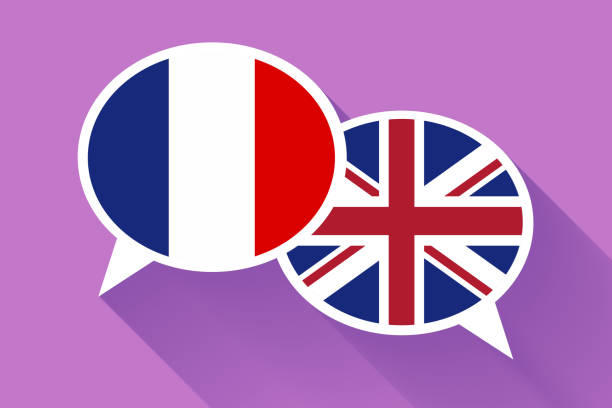
By
Last updated:
February 17, 2023
Did you know that you were already semi-French before actually deciding to learn the language?
At least 29 percent of the English language derives from “le français,” claiming French as the English language’s biggest influence—but wait, it gets better.
While a majority of English words with French roots have morphed, changing spelling and sound, there are endless everyday words we use in English that have remained purely French.
Here are 35 entirely French words that we use in English.
Contents
- 1. À la Carte
- 2. À la Mode
- 3. Attaché
- 4. Avant-Garde
- 5. Bijou
- 6. Bon Voyage
- 7. Bureau
- 8. Carte Blanche
- 9. Chic
- 10. Cliché
- 11. Connoisseur
- 12. Cordon-Bleu
- 13. Coup de grâce
- 14. Cul-de-Sac
- 15. Débris
- 16. Déjà Vu
- 17. Eau de Toilette
- 18. Encore
- 19. En Route
- 20. Exposé
- 21. Façade
- 22. Faux pas
- 23. Femme Fatale
- 24. Fiancé
- 25. Gauche
- 26. Hors-d’œuvre
- 27. Je Ne Sais Quoi
- 28. Laisser faire
- 29. Matinée
- 30. Mirage
- 31. Pot-pourri
- 32. Risqué
- 33. R.S.V.P
- 34. Souvenir
- 35. Touché
- Why We Use French Words in English
Download:
This blog post is available as a convenient and portable PDF that you
can take anywhere.
Click here to get a copy. (Download)
1. À la Carte
Meaning “according to a menu” in French, this phrase refers to choosing individual items off a menu in both languages.
Je voudrais des frites à la carte. (I would like an order of fries on their own.)
2. À la Mode
This means “of the fashion” in French and is a way of describing something trendy right now.
In the US you will also see it used to indicate that a dish is served with ice cream. This must have hopped languages when serving pastry and vanilla ice cream was very fashionable in France.
C’est très à la mode ! (It’s very fashionable!)
3. Attaché
While this one literally means “attached” in French, English uses it to refer to someone who works for an ambassador.
Elle est attachée à l’ambassadeur du Canada. (She’s an attaché* to the Canadian ambassador.)
*The literal translation is “she is attached to the ambassador”
4. Avant-Garde
“Before guard” or “advance guard” are the literal translations of this French phrase.
English speakers know it as an innovative movement in the arts, usually pertaining to artists who are “advanced” in their fields.
The artistic meaning holds in French, but it can also mean the “front line.”
Andy Warhol était un artiste de l’avant-garde. (Andy Warhol was an avant-garde artist)
5. Bijou
The French word for a small gem or jewel, bijou has adopted a completely different meaning in the English language.
Amongst us English speakers, it’s considered a classy way to describe something stylish while implying that it’s small, like a bijou champagne bar.
Je vais vous acheter un bijou ! (I will buy you a jewel/item of jewelry!)
6. Bon Voyage
I think we’ve all heard this one when leaving on a trip of some kind. The French use this phrase to wish someone a “good trip,” and we use it the same way in English.
Bon voyage ! Tu vas me manquer ! (Have a good trip! I will miss you!)
7. Bureau
While the French version of this word refers to a physical desk, it also refers to an office, which is how English uses it.
The English “bureau” tends to be used for more political or governmental offices, such as the FBI (Federal Bureau of Investigation).
Le bureau des finances a refusé mon prêt. (The financial office denied my loan.)
8. Carte Blanche
In English, this means to give someone the opportunity to do whatever they want to do, surrendering to their whim.
The literal translation is “white card” because when armies surrendered they would pass a white card to the enemy for them to write their terms of surrender on.
Nowadays, the French use this phrase the same way as we do!
Il avait carte blanche. (He had the chance to do whatever he wanted.)
9. Chic
French fashion is known for its simple elegance. In French, someone who is chic is well-dressed.
Now we use the same word in English when we see something that resembles that French style of casual class.
Elle est très chic. (She is so well-dressed.)
10. Cliché
In French, this word refers to something that has become so common that it’s overrated. The meaning is the same in English.
Leur mariage était tellement cliché. (Their wedding was so cliché.)
11. Connoisseur
A connoisseur is someone who is very knowledgeable about something—and we use it to mean the same thing in English.
However it’s worth noting that connoisseur is outdated and rarely used in French these days, so you’ll most likely hear connaisseur or connaisseuse (the masculine and feminine forms, respectively) instead.
Il est un connoisseur de vin. (He is a wine connoisseur.)
12. Cordon-Bleu
This literally means “blue ribbon,” and was once given to Bourbon knights of the highest order as a token of appreciation.
It has since changed meaning in French: it either refers to a cook of the highest standard, or a common dish where breaded chicken is cooked with ham and cheese.
In English, we use this phrase only to refer to the dish.
Je veux être un cordon-bleu. (I want to be a really good chef.)
13. Coup de grâce
During wartime, coup de grâce meant a person’s “blow of mercy” from a sword or rifle in a forgiving manner.
Nowadays, both French and English use coup de grâce as a figure of speech to describe a final straw, sort of like “the cherry on top.”
Il n’y avait même pas de moutarde dans mon sandwich, c’était le coup de grâce ! (There wasn’t even mustard in my sandwich, it was the coup de grâce!)
14. Cul-de-Sac
“Butt of a bag,” meaning “bottom of the bag,” is the literal translation of cul-de-sac, though the original meaning has nothing to do with how English or French speakers actually use the phrase.
Cul-de-sac, mostly seen in real-estate writing, is an elegant English way to say the “dead end” of a road. The same phrase is seen as more informal in French.
Cette rue menait à un cul-de-sac. (This road has lead to a dead end.)
15. Débris
You may not have ever thought of this word as being super French, but it certainly is! Both French and English use this word to refer to broken pieces of material.
La bombe a tout transformé en débris. (The bomb turned everything into debris.)
16. Déjà Vu
“Already seen,” is the English translation of the French phrase we associate with that weird feeling of reliving a past experience.
In France you’ll hear this word on a daily basis, because it’s used to express “having re-seen” a person, place or things, not in another life or dimension. In other words, it’s a factual encounter.
The French do believe in the weird phenomenon, but have a different way of spelling it (with a hyphen), déjà-vu. There is no difference in pronunciation though, which is why context is always key!
As-tu déjà vu ce film ? (Have you “already seen” this film?)
J’ai eu un sentiment déjà-vu. (I had [a feeling of] déjà vu.)
17. Eau de Toilette
This translates literally to “toilet water.” However, it doesn’t mean this at all.
Toilette was the word for a dressing table cover and came to be associated with washing and dressing. You may already know that eau de toilette is a light perfume used for washing/dressing.
It now means the same thing in English and French, so you can rest assured that you won’t be sold toilet water at the local grand magasin (department store).
J’ai acheté une bonne eau de toilette. (I bought a good eau de toilette.)
18. Encore
For English speakers, encore is only related to show biz, shouted when you want a performer to return to the stage and continue the show.
In French, encore is used much more commonly as it literally means “again” or “another. “Yet,” “still” or “even” are more intricate translations. “Pas encore,” “not yet,” is commonly used too.
Il y a encore du riz. (There’s still rice left)
Ce n’est pas encore l’heure. (It’s not time yet.)
The best way to see how these words are used differently in French and English is to hear how French flows when spoken by a native.
To do this you can try checking out videos on YouTube, or watching authentic French videos on FluentU.
The bite-sized clips on this language learning platform feature native speakers using the language naturally, in a variety of different situations—think news reports, music videos and inspiring talks.
The videos also come with interactive subtitles that will help you understand more about how words are used and when. You can even add them to flashcards or quiz yourself on them later.
Plus, if you prefer learning on the go, you can download FluentU on iOS and Android.
19. En Route
This literally means that something is “on the way” and will probably be used in reference to a delivery or someone driving somewhere.
Votre paquet est en route. (Your package is on the way.)
20. Exposé
This literally translates to “exposed.” As a noun, it was originally used to mean an explanation that exposed the reasoning of a decision.
It now means an in-depth tabloid story exposing something scandalous about a public figure. This word means the same thing in France as well.
C’était un exposé sur la star qui avait fait la carrière de Hannah. (It was a tabloid scandal of the star that made Hannah’s career.)
21. Façade
Façade has multiple uses. For one, it’s a fancy word in English for telling someone they’re “fake,” or more nicely, “putting up a front.”
“Frontage” or “face” is the literal English translation of this French word, but more commonly, in both English and French, façade is the “front” or “side” of a building.
La façade de cette maison est ancienne. (The façade of this house is old.)
22. Faux pas
This literally translates to “misstep.” Both languages use it to refer to something that isn’t generally acceptable in the social realm.
Crier dans une bibliothèque est un faux pas. (Screaming in the library is a faux pas.)
23. Femme Fatale
Used to describe a seductive woman with a dangerous streak, this is also one of those terms that’s used in English the same way as in French.
It translates literally to “deadly woman.” When you think about it, that’s quite boring compared to the glamour and sass we imply when we use the term in English.
Regardez, c’est une femme fatale ! (Look, she’s a femme fatale!)
24. Fiancé
Yes, this is another famous French word that slips by many of us. There is no translation since fiancé is, well, a fiancé.
Je vous présente mon fiancé. (I introduce you to my fiancé.)
25. Gauche
Literally meaning “left” in French, this is often used in English to mean social awkwardness.
It may have gotten this meaning from how everything is more awkward for left-handed people in a right-handed world.
Il est un peu gauche. (He is a little awkward.)
26. Hors-d’œuvre
“Out of work” is the literal translation of this phrase, as hors d’œuvre were once served out of the work of art (the main course) and thus, hors d’œuvre was born.
Now, both languages use this to refer to small dishes that come before a main course such as deviled eggs, cheese and crackers, etc.
Les hors-d’œuvre étaient vraiment délicieux. (The hors d’oeuvres were very delicious.)
27. Je Ne Sais Quoi
This French phrase is often translated as “that certain something” but literally translates into “I don’t know what.”
This is a universal phrase for a quality that’s hard to describe but very attractive.
Elle avait un certain je ne sais quoi. (She had a certain indescribable but attractive quality.)
28. Laisser faire
You’ll usually hear this one used to describe a management or coaching style. It literally means “let it happen” and demonstrates a relaxed, “hands-off” kind of attitude.
Il préfère laisser faire ses employés. (He prefers to be hands-off with his employees.)
29. Matinée
On the French side, matinée means “morning,” or the “entire morning” (from sunrise to noon).
In English, this word usually refers to the first showing of a movie or show that takes place in the morning.
While the French might also have their matinée movie deals, for them it refers to the “first showing” in the afternoon, not morning.
Une matinée de ballet. (An afternoon performance of ballet.)
30. Mirage
To “look at” or “wonder at” is the literal translation of this French word. It also means to “mirror ” or “admire,” hence why English speakers use mirage to define a visual wish or desire.
J’ai cru voir une île; c’était un mirage. (I thought I saw an island; it was a mirage.)
31. Pot-pourri
Pot-pourri translated into English is “rotten pot.” In French it’s spelled pot-pourri or pot pourri, and has the same meaning as its English counterpart: fragranced dried flower, fruits and herbs used to get rid of bad odors.
J’ai acheté ce pot-pourri pour la salle de bain. (I bought this potpourri for the bathroom.)
32. Risqué
In English, risqué takes an improper, indecent tone that’s sexually suggestive.
Risqué [rees-key] or risque [ri-skey], the latter sounding similar to how we say “risk” in English, are the two pronunciations in French which have the same and only meaning of “risk” in English.
Risqué may have moved into English because of Moulin Rouge, cabarets, and burlesque shows, but in French it only means “risk:”
Il y a un risque d’avalanche. (There’s risk of an avalanche.)
33. R.S.V.P
You’ve been invited to countless weddings, showers and parties your whole life, but did you ever think about what R.S.V.P stands for? In case you never did, it’s an original French acronym:
Répondez s’il vous plaît.
This acronym in English means “Respond If It Pleases You” or “Respond If You Please.”
34. Souvenir
If you’re returning from an amazing trip, you’ll no doubt bring back an amazing gift for yourself or friends, otherwise known as a souvenir—a tiny piece of memorabilia.
For English speakers, a souvenir is tangible, physical, and visible. For the French, the verb souvenir also means to “remember” or “recall.”
Je me souviens. (I remember.)
Peux-tu acheter un souvenir pour moi ? (Can you buy a souvenir for me?)
35. Touché
English speakers use this French phrase after a smart aleck remark or quick, witty response. In fencing (or any battling), touché can also be a “hit.”
In French it simply means to “touch,” which is written similarly, but with no hidden meaning as we’ve created.
As-tu déjà touché un serpent ? (Have you ever touched a snake?)
Touché ! (You’re on!)
Why We Use French Words in English
As French evolved from old Gaulish and Latin into what it is today, it became ever more universal. Even before modern borders were established, the French language was very dominant in the area of modern day England.
And while English evolved and became more of its own language, at the same time it also took on quite a bit of French in its formation.
Many English words at least have a French base, if not being the same word entirely. In fact, it’s estimated that there are over 7,000 French words used in English!
Today with the help of technology, the world is becoming more and more globalized—meaning different languages and cultures are interacting with each other as they never could before.
This has led to an inevitable exchange of words and phrases between many languages. Considering that French and English are considered some of the most universal languages, it’s no surprise that they exchange words.
And there you have it, a few French phrases that are officially part of the English language.
Can you think of any more?
Download:
This blog post is available as a convenient and portable PDF that you
can take anywhere.
Click here to get a copy. (Download)
Updated: March 7, 2021 by Elie in French Vocabulary ▪
Influence of French language on English
The French language has greatly influenced the English vocabulary.
Up to 30% of the English words have their origin in French. Today, English speakers wouldn’t recognize many English words that come from French. Although, these French words are commonly used in English every day.
This is great news for English speakers looking to learn French. Of course, some words have changed their original meaning as they evolved in their new environment and culture.
Truth to be said, French and Latin words weren’t easily adopted by all English speakers. Many tried to propose native replacements to these terms when these words were new.
The French language: en marche
But the fates of languages cannot be predicted. These days English words are invading, not only French but also many other languages.
It is not surprising to hear that the French government attempts to protect the French language by creating new French terms to replace common Anglicisms.
Meanwhile, the growing number of French speakers as well as the many defenders of French are good signs that French is one of the most popular languages that foreigners want to learn.
Nevertheless, there is no better than quoting Victor Hugo, the famous French poet and novelist, to illustrate the constant changes in the French language:
“The French tongue is not fixed and never will be. A language does not become fixed. The human intellect is always on the march, or, if you prefer, in movement, and languages with it.”
French translation: “La langue française n’est pas fixée et ne se fixera point. Une langue ne se fixe pas. L’esprit humain est toujours en marche, ou, si l’on veut, en mouvement, et les langues avec lui.“
Now that you are aware that there are plenty of common French words used in English, I’m going to provide you with a list of 18 French-English cognates. But first, let me define what I mean by the word cognate.
What is a cognate?
By definition, cognates are words from two languages that are the same or similar. Examples of cognates in French and English are words like president, conclusion, solitude, actor, etc.
Such words are called cognates. Regardless of their roots, the following English words are the same, or almost the same, in French today.
Learn French with quotes
Vocabulary matters. But French culture matters too. For this reason, I invite you to discover some of the most beautiful quotes of Victor Hugo in which you’ll find words that are the same in French and English.
Again, Victor Hugo is a French poet and novelist as mentioned earlier in this article. He’s mostly known for writing the novels Les Misérables, 1862, and The Hunchback of Notre-Dame (French: Notre-Dame de Paris), 1831.
Which words are the same in French and in English?
If you know the following words in English then you’re all set with the associated French vocabulary. At the same time, you’ll be learning famous French proverbs.
With the rules that you’ll observe below, you’ll be able to generalize the acquired clues to a larger number of words that you, already, use in your daily conversations. That’s brilliant, no?
A list of 18 words that are identical in French and English:
- Accident
- Compliment
- Intelligent
- Capable
- Admirable
- Passion
- Religion
- Suggestion
- Architecture
- Nature
- Posture
- Impossible
- Invisible
- Visible
- Prison
- Artist (artiste in French)
- Future (futur in French)
- Invasion
With these 18 French terms used in English, not only you’ll instantly boost and grow your French vocabulary but also you’ll discover the best French quotes by Victor Hugo with their English translations. You’ll read these French phrases in English as well as in French.
French-English cognate patterns
In the following cognate patterns, you’ll often find French words used in English:
- French Words ending with “ent”
- French Words ending with “ble”
- French Words ending with “ion”
- French Words ending with “ure”
- French Words ending with “ible”
- More French words used in English
All the quotes below are by Victor Hugo.
French words used in English
Now you have a list of 18 common French words used in English. In addition to that, let’s discover beautiful quotes by Victor Hugo in which these words are used.
When the word ends with “ent”
The rule for words that end with “ent” is very easy. Most of the words that end with “ent” are identical in French and English. Let’s see some examples.
1 – Accident
- Quote in English: Revolutions are not born of chance but of necessity.
- Quote in French: Les révolutions sortent, non d’un accident, mais de la nécessité.
2 – Compliment
- Quote in English: A compliment is like a kiss through a veil.
- Quote in French: Le compliment, c’est quelque chose comme le baiser à travers le voile.
3 – Intelligent
- Quote in English: An intelligent hell would be better than a stupid paradise.
- Quote in French: Mieux vaudrait encore un enfer intelligent qu’un paradis bête.
When the word ends with “ble”
Most French words that end with the suffix “ble” are identical in French and English. Here are three words that you can use similarly in French and English. The only difference is their pronunciation.
4 – Capable
- Quote in English: He who is not capable of enduring poverty is not capable of being free.
- Quote in French: Qui n’est pas capable d’être pauvre n’est pas capable d’être libre.
5 – Admirable
- Quote in English: Amnesty is as good for those who give it as for those who receive it. It has the admirable quality of bestowing mercy on both sides.
- Quote in French: Ce que l’amnistie a d’admirable et d’efficace, c’est qu’on y retrouve la solidarité humaine.
When the word ends with “ion”
Words that end with “ion” are also in the list of French words used in English. In the following, the words passion, religion, and suggestion are exactly the same words in both languages. Let’s read the citations from Victor Hugo.
6 – Passion
- Quote in English: The heart becomes heroic through passion. It is no longer composed of anything but what is pure; it no longer rests upon anything but what is elevated and great.
- Quote in French: Le cœur devient héroïque à force de passion : il ne se compose plus que de rien de pur ; il ne s’appuie plus que sur rien d’élevé et de grand.
7 – Suggestion
- Quote in English: Suggestion is to do in the minds of others a small incision where one puts an idea from oneself.
- Quote in French: La suggestion consiste à faire dans l’esprit des autres une petite incision où l’on met une idée à soi.
8 – Religion
- Quote in English: Religion is nothing but the shadow cast by the universe upon human intelligence.
- Quote in French: La religion n’est autre chose que l’ombre portée de l’univers sur l’intelligence humaine.
When the word ends with “ure”
As for the words that ends with “ure“, they are identical in French and English. Note that in French, most of these words are feminine. Here are 3 examples with the associated quotes from Victor Hugo.
9 – Architecture
- Quote in English: Architecture is the great book of humanity, the principal expression of man in his different stages of development, either as a force or as an intelligence.
- Quote in French: L’architecture est le grand livre de l’humanité, l’expression principale de l’homme à ses divers états de développement, soit comme force, soit comme intelligence.
10 – Nature
- Quote in English: Legendary truth is of another nature than historical truth. Legendary truth is invention whose result is reality.
- Quote in French: La vérité légendaire est d’une autre nature que la vérité historique. La vérité légendaire, c’est l’invention ayant pour résultat la réalité.
11 – Posture
- Quote in English: There are thoughts which are prayers. There are moments when, whatever the posture of the body, the soul is on its knees.
- Quote in French: Il y a des pensées qui sont des prières. Il y a des moments où, quelle que soit la posture de votre corps, l’âme est à genoux.
When the word ends with “ible”
French terms with “ible” as suffix follow also the same rule. For most of these words, they are the same in French and English.
12 – Invisible
- Quote in English: The memory is the invisible presence.
- Quote in French: Le souvenir, c’est la présence invisible.
13 – Visible/Invisible
- Quote in English: A man is not idle, because he is absorbed in thought. There is visible labor and there is an invisible labor.
- Quote in French: Il y a le labeur visible et le labeur invisible. Contempler, c’est labourer ; penser, c’est agir. Les bras croisés travaillent, les mains jointes font.
14 – Impossible
- Quote in English: Nothing is more imminent than the impossible.
- Quote in French: Rien n’est plus imminent que l’impossible.
More French sayings with French-English words
Below is another set of French sayings from the well known Victor Hugo. Similarly, these phrases include a number of common French words used in English.
15 – Prison
- Quote in English: He who opens a school door closes a prison.
- Quote in French: Celui qui ouvre une porte d’école, ferme une prison.
16 – Artist
- Quote in English: A great artist is a great man in a great child.
- Quote in French: Un grand artiste, c’est un grand homme dans un grand enfant.
A slight difference is that in French the word artist takes an “e” at the end of the word (artiste).
17 – Future
- Quote in English: What is history? An echo of the past in the future; a reflex from the future on the past.
- Quote in French: Qu’est-ce que l’histoire ? Un écho du passé dans le futur ; un réflexe du futur sur le passé.
In this case, it is the English word future that takes an extra “e” at the end of the word.
18 – Invasion
- Quote in English: An invasion of armies can be resisted, but not an idea whose time has come.
- Quote in French: On résiste à l’invasion des armées, on ne résiste pas à l’invasion des idées.
Is learning French an idea whose time has come?
If that’s the case, let’s start your French learning journey with Master Your French! You can find other articles on this blog to learn French greetings, to study how to ask for directions in French, among many other useful materials. To revisit some of your French vocabulary lists you can check the beginner’s guide to learn French vocabulary. Start speaking French as early as you can and you’ll gradually build up accuracy and fluency.
No wonder that English speakers who studied French at school, or on their own, are able to read texts and even books in French. It is great that English speakers are familiar with French vocabulary and that there are many common French words used in English as we saw in this article. However, to fully benefit from a foreign language it is not enough to learn reading and writing.
Beyond these essential skills, it is important and even enjoyable to speak French. In the end, as stated in one article about the use of phonetics in teaching elementary French: Language and sound must go together and the ear is an indispensable aid to the eye. Without an intelligible pronunciation, communicating with native speakers in French might not be successful. Here are 4 tips to improve your French pronunciation.
Don’t worry that your French is riddled with gaps and mistakes. It is only by practicing that you’ll be able to eliminate many difficulties that stand in the way of intelligibility.
Go to Master Your French YouTube channel and watch the videos to learn to pronounce French. Or better join the online French courses to master your French.
Having a déjà-vu? Well perhaps it’s because you read our list of words the English language has borrowed from German. But it was so fun researching and writing that article that we decided to do the same for French, which—with the Norman occupation of England in the 1100’s—has had a profound impact upon the English language.
French and English also share many Latin influences and as a result, the two languages overlap in many interesting ways. So, with that said, here are our 25 favorite French words used in English!
P.S. If you’re currently learning French and are looking for powerful study tool to help you master vocab, common phrases, and verb conjugations so much more efficiently, check out Brainscape’s certified French flashcards.
1. Déjà-vu
Déjà = already
Vu (passé composé form of voir = to see) = seen
Already seen (before).
2. à la mode (not used as such in French)
à (preposition) = in(to), at
La mode = way, style
In the way (style) of.
3. Cul-de-sac
cul (coll./vulgar) = bottom, ass
de (preposition) = from, of
sac = bag
Bottom (ass) of the bag.
4. RSVP = répondez s’il vous plaît
Répondez, 2nd person plural of répondre = to reply, to answer
S’il vous plaît = please
[However, it is a compound of
s’ (abbrev. of si) = if
il = he/it
vous = you (formal)
plaît (3rd pers. sing. of plaire) = to care for, to please]
Reply, if it pleases you.
5. Chaise longue
Chaise = chair
Longue = long
Long chair.
6. Crème brûlée
Crème = cream
Brûlée (participe passé of brûler = to burn) = burnt
Burnt cream.
7. Du jour
Du (de = from, of + le = the) = of the
Jour = day
Of the day.
8. Café au lait
Café = coffee
au (à = in; with + le = the) = in/with the
Lait = milk
Coffee with milk.
[Hey! Learning a foreign language? Check out ‘The best way to learn a language online—your complete toolkit’.]
9. Carte blanche
Carte = card
Blanche (feminine form of blanc) = white
White card (i.e. blank canvas = complete freedom to act as one wishes)
10. Comme ci, comme ça
Comme = like
ci = this
ça = that
Like this, like that.
11. Eau de toilette
Eau = water
de = from, of
toilette = toilette, wash [toiletter = to groom]
Grooming water.
12. Fait accompli (not used as a stand-alone)
Fait = act, fact
Accompli = accomplished
Accomplished fact.
[Read: ‘The 9 best apps to learn French’]
13. Femme fatale
Femme = woman
Fatale = fatal, deadly
Deadly woman.
14. Film noir
Film = movie
Noir = black
Black (dark) movie.
15. Foie gras
Foie = liver
Gras = fatty
Fatty liver.
16. Grand Prix
Grand = great, large
Prix = prize
Great prize.
17. Hors d’œuvre
Hors = outside
d’ (de) = from, of
œuvre = work
Outside (of) the work, i.e. not part of the ordinary set of courses in a meal.
18. Joie de vivre
Joie = joy
de = of
vivre = to live
Joy of living.
[Check out this Academy guide: ‘Reading is one of the BEST ways to learn a language’.]
19. Laissez-faire
Laissez, 2nd pers. plural of laisser = to let, to leave
Faire = to do
Let do, i.e. to leave as it; to let be.
20. Ménage à trois
Ménage = household
Trois = three
Household of three (Ha! you were thinking something else?)
21. Objet d’art
Objet = object
Art = art
Object of art.
22. Raison d’être
Raison = reason
être = to be
Reason for being.
23. Vis-à-vis
vis = face
Face to face.
24. Avant-garde
Avant = before, (in) advance (of)
Garde = guard
Advance guard.
25. Faux pas
Faux = false, wrong
Pas = step; move
False/wrong step.
Learn French more efficiently
Understanding French empowers you to order off the menu with greater confidence; sound uber attractive to your desired gender; opens up incredible opportunities for travel in 29 countries; and helps you to understand your own language, English, better.
And since there’s no better time to learn French than the present, go ahead and get Brainscape’s certified French flashcards in your corner, and don’t read our comprehensive language guide to learning French more efficiently to supercharge and streamling your learning journey.
Bonne chance!
Get our free email course, Shortcut to Conversational.
Have conversations faster, understand people when they speak fast, and other tested tips to learn faster.
More info
Learning French can be a rewarding experience, especially if you are already proficient in English. In fact, there are a lot of French words used in English, since it’s been used for centuries to give English a certain flair. French words are especially prevalent in the food and fashion industries, for example.
To help you see the common roots of both languages, we compiled this list of 20 common French words used in English.
À la mode
À la mode is a quintessential fashion expression, meaning that something is in style.
- Tight jeans are so à la mode right now. – Les jeans moulants sont tellement à la mode en ce moment.
For some reason, à la mode in English can also be used as a fancy way to say with ice cream. This use does not exist in French!
- I’ll take an apple pie à la mode, please. – Je vais prendre une tarte aux pommes avec de la glace, s’il vous plaît.
Apéritif
While apéritif only refers to alcoholic drinks served before a meal in English, it can refer to both drinks and appetizers in French.
- Would you like an apéritif ? I can offer you Ricard and pretzels. – Voulez-vous un apéritif ? Je peux vous offrir un Ricard et des bretzels.
Blasé
In both languages, blasé is an adjective meaning that someone appears fairly indifferent about something.
- I’m a bit blasé about life. – Je suis un peu blasé de la vie.
Bon vivant
A bon vivant describes someone who enjoys life.
- Paul enjoys good food and wine. He is a true bon vivant. – Paul apprécie la bonne nourriture et du bon vin. C’est un vrai bon vivant.
Bouquet
A bouquet is a quintessential French word used in English, always with its silent t.
- I gave my wife a bouquet of roses. – J’ai donné un bouquet de roses à ma femme.
Bureau
English speakers use bureau to describe a specialized office, usually in officialdom. Its use is much more general in French, meaning simply an office, and also just a desk in French.
- She must drop by the immigration bureau. – Elle doit faire un saut au bureau d’immigration.
- I forgot my phone on my desk at the office. – J’ai oublié mon téléphone sur mon bureau au bureau.
Chef
In French, un chef can refer both to a professional cook and a boss.
- The chef made us an amazing dessert. – Le chef nous a fait un dessert impressionnant.
- Our boss loves endless meetings. – Notre chef aime les réunions interminables.
Cliché
In both English and French, a cliché is similar to a stereotype. This use can be either an adjective or a noun in both languages. As a noun, un cliché in French can also refer to a photograph.
- This movie is so cliché. – Ce film est tellement cliché.
- I took a nice photo of the old bridge. – J’ai pris un beau cliché du vieux pont.
Cul-de-sac
In both languages, a cul-de-sac refers to dead end, usually of a road or path. The literal translation of cul in French is butt or ass, so un cul-de-sac is literally a bag’s butt end. While in English this usually refers to an end-of-road layout that’s rounded to facilitate turning around, in French we use cul-de-sac for the end of a dead-end road of any shape.
Note that in French the l in cul is silent, whereas in English it’s pronounced the same as cull.
- This road ends in a cul-de-sac. – Cette route finit en cul-de-sac.
Début
While English speakers use début for someone’s first public performance, the main meaning in French is beginning.
- The young artist made his début last year. – Le jeune artiste a fait ses débuts l’année dernière.
- I started my new job at the beginning of the year. – J’ai commencé mon nouveau travail en début d’année.
En route
This is a great expression meaning that someone or something is on their way.
- My package is en route to France. – Mon colis est en route pour la France.
Entrepreneur
Entrepreneur is derived from the French verb entreprendre, which means to undertake. In both languages, it refers to someone who starts a new business.
In French, un entrepreneur is also commonly used on its own to refer to a contractor in the building trades, though it’s often accompanied by a description of the person’s specialty.
- With so many regulations, it is difficult to be an entrepreneur nowadays. – Avec autant de réglementations, c’est difficile d’être un entrepreneur de nos jours.
- I hired a plumbing contractor to redo our bathroom. – J’ai engagé un entrepreneur en plomberie pour refaire notre salle de bains.
Fiancé, Fiancée
In French, the verb to become engaged to be married is se fiancer. Following les fiancailles, or the engagement, the engaged man is known as le fiancé, and the engaged woman is la fiancée.
Both of these titles for the engaged individuals have been adopted into English with the same pronunciation and the same accented é.
- Let me introduce you to my fiancé Simon. – Laissez-moi vous présenter mon fiancé Simon.
- Lovely to finally meet you, Simon. I’ve known your fiancée Adèle since university. – Ravie de vous rencontrer enfin, Simon. Je connais ta fiancée Adèle depuis l’université.
Gauche
In both English and French, gauche is an adjective meaning awkward or clumsy. It can also translate to left in French.
- She is a bit gauche sometimes, but we still invite her out. – Elle est un peu gauche parfois, mais nous l’invitons quand même à sortir.
- Sometimes I feel like I have two left hands. – Parfois, j’ai l’impression d’avoir deux mains gauches.
Queue
When you need to wait in line for something, the line is called a queue in both English and French. Another word for this waiting line in French is une file d’attente.
In English a queue is also a type of list where things are processed in order, like when you add songs to a playlist.
The main meaning of queue in French is actually a tail, whether of an animal or of something else like a plane or a parade. Be careful of context when you use this word in Canada, because in québécois French, une queue is also a slang term for a penis or a dick.
Although queue is written identically in both French and English, the pronunciation is different. In English queue is pronounced the same as the English word cue, while in French it’s pronounced the same as the French word que.
- I spent almost one hour in the queue ! – J’ai passé presque une heure dans la queue !
- I’ll add your song to my queue and play it after the others. – Je vais ajouter votre chanson à ma file d’attente et la jouer après les autres.
- The beaver has a big flat tail. – Le castor a une grosse queue plate.
Restaurant
Did you know that un restaurant is a French word? In French we often even shorten it to un resto.
- La Tour d’Argent is a very famous restaurant. – La Tour d’Argent est un restaurant très connu.
Sauté
Sauté comes from the French verb sauter, meaning to jump. In both languages, sauté can be used as either a noun or a verb to describe cooking morsels of food in a pan, though if it’s used as a verb in French it may take a different form.
- I like to sauté my vegetables. – J’aime bien faire sauter mes légumes.
- My mom prepared a delicious chicken sauté for dinner. – Ma mère a préparé un délicieux sauté de poulet pour le dîner.
Soirée
A soirée is a casual party, usually with a touch of class.
- We are invited to a fancy soirée tomorrow night. – Nous sommes invités à une soirée chic demain soir.
Tête-à-Tête
A tête-à-tête is private meeting between two people. Its literal translation in French is head-to-head.
- My boss requested a tête-à-tête with me. – Mon patron m’a demandé que l’on se voit en tête-à-tête.
Voilà
Voilà is an expression of accomplishment similar to there it is! or ta-da!
- You add the fruits and voilà, your cake is ready! – Vous ajoutez les fruits et voilà, votre gâteau est prêt !
Conclusion
It is remarkable to observe how many French words have been adopted into English. These French-rooted words are employed in both languages with regularity, illustrating just how deeply intertwined these two languages are.
We only listed 20 today, but there are actually hundreds of them. If you want even more, you can take a look at our other LingoCulture post on French words used in English.
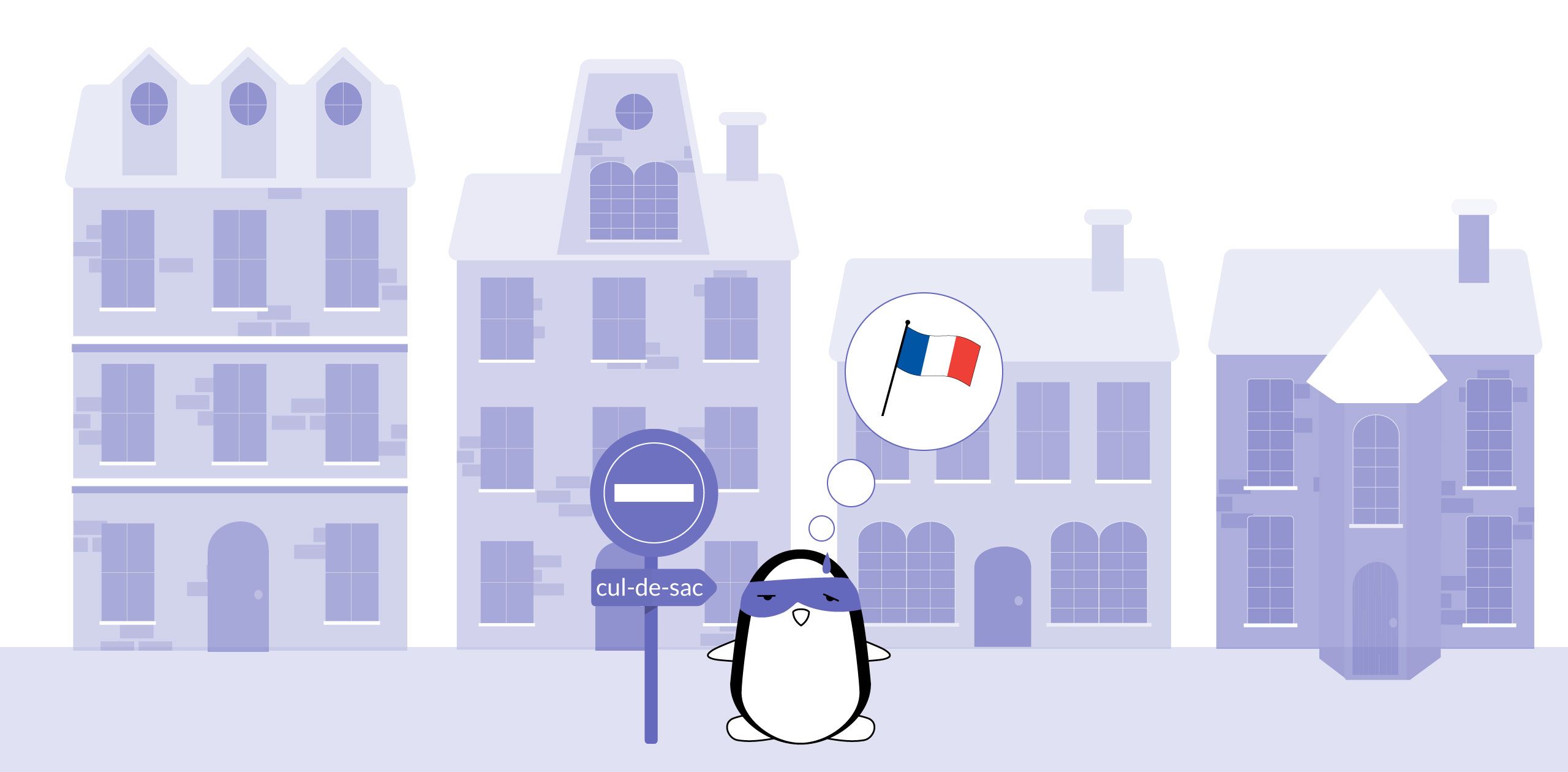
There is no doubt that the French language has had a profound impact on English over the years. In fact, there are currently numerous French words that are used in English today. But why do so many French words find their way into our language? And where did they come from in the first place?
One of the main reasons why so many French words have found their way into English is because of the close relationship that has historically existed between their countries of origin. In fact, for centuries, France was one of England’s closest allies. As a result, the two countries have shared a lot of linguistic influence over the years.
But it’s not just because of historical ties that French words have found their way into English. Many of these words have also become popular because they sound sophisticated and chic. After all, there’s something undeniably alluring about the French language, and its associated words just seem to roll off the tongue.
So without further ado, let’s take a look at some of the most common French words used in English – you’ll definitely recognize at least a few of them.
Learn French with Langster
Etiquette
Etiquette is a French word that means «rules of conduct.» It derives from the French verb étiqueter, which means «to label» or «to classify.» In English, etiquette refers to how one should behave in specific social situations.
Etiquette is about what’s appropriate and inappropriate when it comes to manners and behavior. It tells us things like how to dress, how to speak, and how to act in upscale settings.
Sabotage
Sabotage is a French word that means «to damage» or «to destroy.» It comes from the French verb sabot, which referred to a kind of wooden boots worn by peasants. During industrialization times, disgruntled peasants protested factories by throwing their wooden boots into the machinery to destroy it.
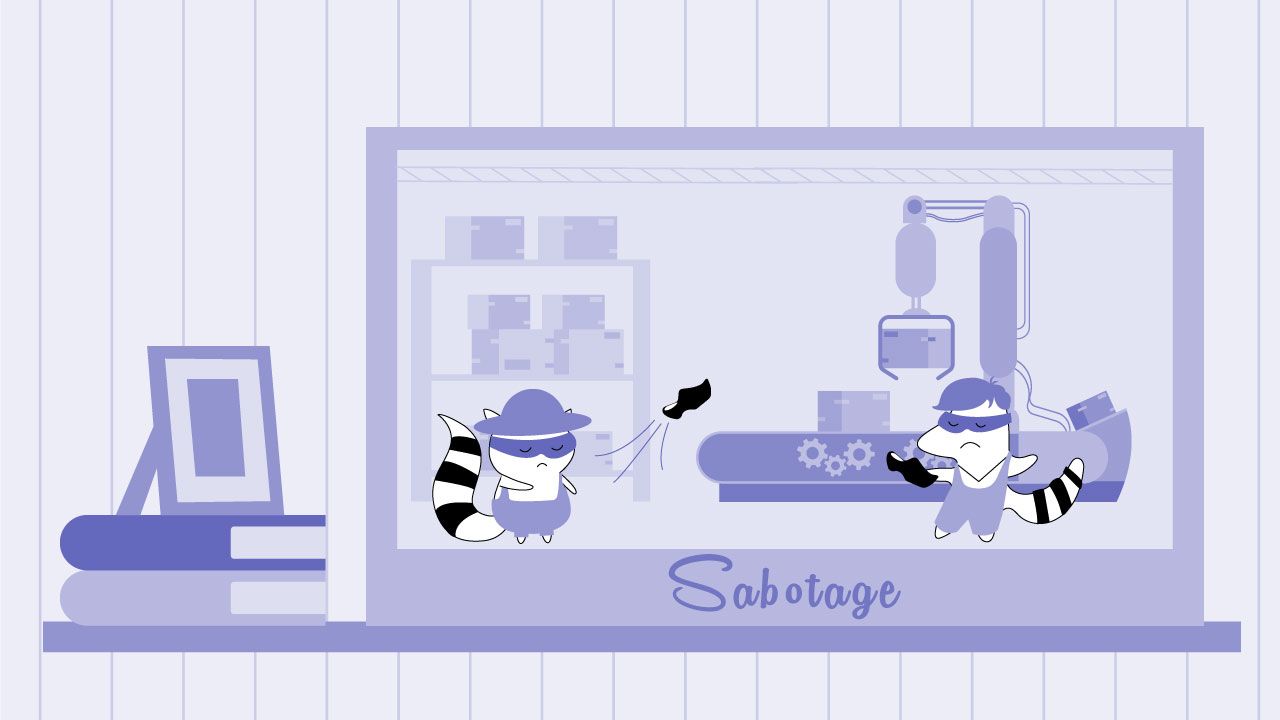
In English, the word sabotage refers to any deliberate action that is taken in order to damage or destroy something. It can be used to describe physical acts of destruction, like vandalizing a building, or it can refer to more subtle forms of sabotage, like spreading rumors about someone.
Dentist
Dentist is one of the English words that have a French origin – and when translated literally, it simply means «toother.» It comes from the French verb dents, or «teeth.»
In English vocabulary, the word dentist means a medical professional who specializes in the diagnosis and treatment of teeth-related problems. In modern French, the similar word, dentiste, is used.
Déjà-Vu
Déjà-vu is a colloquial French phrase that means «already seen.» It comes from the French verb déjà, which means «already,» and the noun vu, which means «seen” – so the translation is pretty simple.
In French, however, you can hear this word in two variations: déjà vu, which expresses re-seeing something or someone; and déjà-vu (with a hyphen), which relates to the weird phenomenon of feeling like you’ve already experienced something.
Mirage
Mirage is a French word that means «illusion.» It comes from the Latin word mirari, which means «to look at» or «to wonder at.»
In English, a mirage is an optical illusion caused by atmospheric conditions. When you see a mirage, it looks like there’s water in the distance, but as you get closer the image of water disappears.
Façade
Façade is a French word that means «front» or «face.» It comes from the Latin word facies, which means «face.» Nevertheless, it’s not used in modern French with this meaning – the word for a person’s face is visage.
Just like the English, the French meaning of facade is the front or face of a building. It’s the part of the building that you see when you look at it from the street. The facade is often the most decorated part of a building.
Pot-pourri
Pot-pourri is a French word that means «a mixture.» It comes from the Old French word pourri, which referred to rotting or decaying matter. So, to translate literally, pot-pourri would mean a rotting pot.
Nevertheless, as in English, in French, potpourri refers to a mix of dried flowers and spices used to get rid of bad odors. It’s often placed in wardrobes and drawers – to keep things smelling fresh.
Cliché
Cliché is a French word that means «stereotype.» It comes from the French verb clicher, which means «to make a print» or «to reproduce.»
If you speak English, you probably know that a cliché is an overused phrase or idea that has become trite and unoriginal. Clichés are often used in writing and in everyday speech. They can be phrases, like «a dime a dozen,» or ideas, like «love conquers all.»
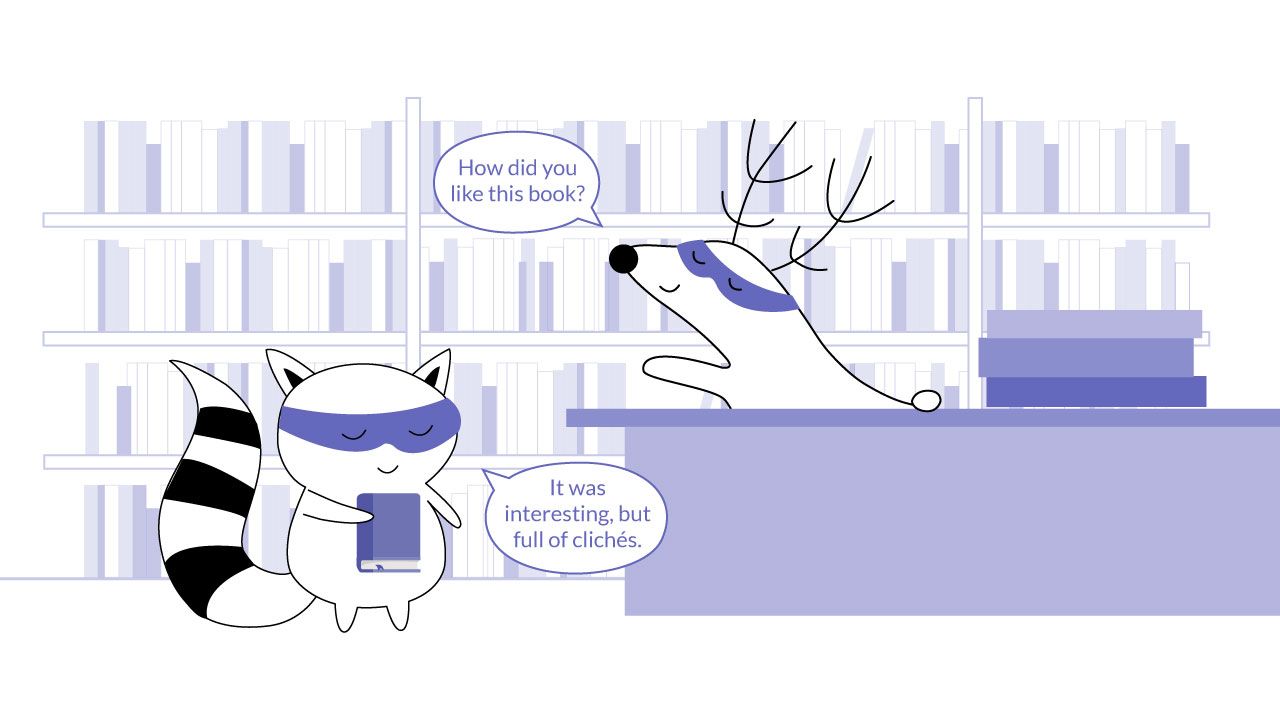
En route
En route is a French phrase that means «on the way.» It comes from the French preposition en, which means «in,» and the noun route, which means «road» or «route.»
In English, the phrase en route is used to describe something that’s happening while you’re going somewhere. For example, you might say, «I got a call from my boss en route to the meeting.»
Queue
Queue is a French word that means «tail.» It comes from the Old French word cue, which also meant «tail.»
In English, a queue is a line of people or vehicles waiting for something. For example, you might say, «There was a long queue at the grocery store this morning.» However, note that this word is only used in British English – in American English, you would use the word “line.”
Cul de sac
Cul de sac is a French phrase that means «dead end.» It comes from the French words cul, which means «bottom,» and de sac, which means «of a bag.»
English speakers use cul-de-sac to refer to a street with only one way in or out. It’s often used as a residential street because it’s considered a safe place for children to play.
Hors d’œuvre
Hors d’œuvre is a French phrase that means «out of the work.» It comes from the French words hors, which means «out of,» and œuvre, which means «work.»
When English speakers are talking about hors d’œuvres, they are talking about small dishes – often finger foods – that are served before the main course. Note that in English, you can make a plural out of this word: hors d’oeuvres, but in French, it exists only in the singular form.
R.S.V.P
R.S.V.P. is one of the French phrases that came to the English language as part of etiquette and stayed. It stands for «répondez, s’il vous plaît,» which means «respond, please.» It’s an abbreviation often used on invitations to let the host know whether or not you’re coming to the event.
In English, when you receive an invitation with R.S.V.P., it’s considered polite to respond – either «yes» or «no.» The host usually needs to know how many people will be attending so that they can prepare accordingly.

A la carte
A la carte is a French phrase that means «according to the menu.» It comes from the French words à, which means «to,» and la carte, which means «the menu.»
In English, when you order à la carte, you order each item on the menu separately. For example, a waiter might ask you «Would you like the a la cart or the prix-fixe menu?»
Souvenir
Souvenir is a French word that means «memory.» It comes from the Latin word subveniō, which means «to come to mind.»
In English, a souvenir is an object that you keep to remember a person, place, or event. For example, you might buy a snow globe as a souvenir from your trip to Paris. Nevertheless, when using this word in French, make sure to remember its original meaning.
Chic
Chic is a French word that means «stylish.» Its origin is not well-known, but it might come from the Old German word Schick, which means «skill» or «talent.»
The English word “chic” means someone or something that’s fashionable and stylish. For example, you might say, «She always looks so chic in her designer clothes.»
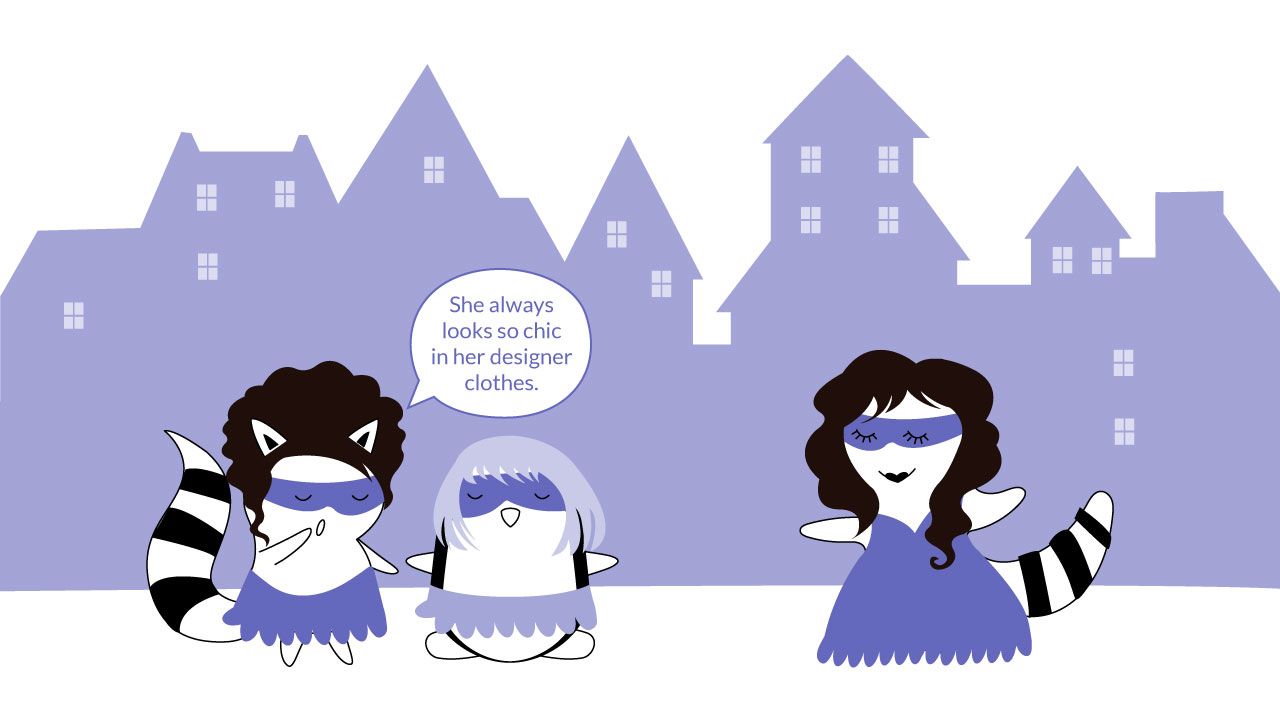
Ambulance
Ambulance is a word derived from French that can literally be translated as a “walking hospital.” It comes from the Latin word ambulō, which means «to walk.»
Today, both in French and in English, an ambulance is a vehicle used to transport people who are sick or injured to the hospital.
Restaurant
Restaurant is a French word that comes from the Latin word restaurāre, which means «to restore.» The literal meaning of the original Latin is «to restore with food.»
In modern English and French, a restaurant is a place where you can buy and eat food.
Faux-pas
A faux pas is a French term that means «a mistake.» It comes from the French words faux, which means «false,» and pas, which means «step.»
In English, it’s a social mistake. For example, you might say, «Making a rude comment at the dinner table was a major faux pas.»
Fiancé
Fiancé is a French word that means «betrothed.» It comes from the Old French word fiancer, which means «to betroth.» And, if you ask as, it is one of the most beautiful words both in French and in English.
In English and French, a fiancé is a man who is engaged to be married. The female equivalent is fiancée. As you can see, the English grammar in this word also has come under strong French influence, as in English, the word endings don’t change according to the word gender.
The French Language Is Full of Surprises
It’s interesting to see how many French words have also become English words. Out of the 20 words used in English that we’ve listed, 17 have the same meaning and origins. Additionally, all of these English words are used in both languages regularly. This just goes to show you how much influence French has had on the English language – and vice versa.
French has a long and rich history, and there are many more words and grammar similarities that you can see in English today. If you’re interested in learning more, be sure to check out our website or download the Langster app.
Boost your French vocabulary, start speaking French quickly, and make sure that your language learning journey is as interesting and exciting as possible.
By OptiLingo • 6 minute read
You Use a Lot of French Words in English
It may surprise you to learn that, as an English speaker, you already know a fair amount of French. And this can help you learn French faster. But knowing what these loanwords and cognates are, you can enhance your French vocabulary quickly. Find out which French words are used in English every day.
Why Is There So Much French in English?
A brief refresher history lesson will help you understand how French came to be one of the foundations for modern English. Linguists often consider the origins of the English language ripe for debate. Ancient cultures in the British Isles spoke Celtic-based languages. The Romans invaded Britain around 50 AD, bringing the Latin language with them. Latin would become an essential language in the public life of Britain during Roman rule.
The Anglo-Saxon invasion in the 5th and 6th centuries involved the introduction of Germanic languages that were responsible for many of the foundations of English. The origins of French words in the English language dates to 1066, the year of the Norman Conquest. The Normans who ruled England spoke a dialect known as Anglo-Norman French. Because of Norman rule, this dialect became an essential part of English culture, as well as law and administration. French words, even some of the quirkier ones, have had a steady place in English ever since.
How Much of English Comes From French
Thanks to the French occupation of the British Isles, English has plenty of vocabulary of French origin. Did you know that well over 10,000 English words come from French? Besides words that come from French, many other English words come from Latin, which French has its origins in.
Many words in English either have close equivalents or exact counterparts in French, which is pretty impressive. Where did all these words come from, anyway? We’ll take a closer look at French’s influence on our language, and you might even build up your vocabulary.
How Many French Words Are in English?
About 7,000 French words are in the modern English language. Initially, there were about 10,000 French-origin words in English.
England’s sometimes-complicated history his given it influences from many languages. However, here are some interesting facts:
- 58% of words in modern English have Latin and French origins
- 29% of words in modern English have entirely French origins
- English and French have 170,000 true cognates, similar or same words with identical meanings in both languages

Psst! Did you know we have a language learning app?
You’re only one click away!
Common French and English Suffixes
The -tion suffix found in words like action is common to a lot of words in both languages. There are other suffixes that lead to common words, such as:
- -isme, such as le racisme (racism) and l’impressionnisme (impressionism)
- -able, such as adorable, la table, and capable
- -ssion, such as la passion and la mission
- -tion, such as attention or l’accélération
- -if/ive, such as créative or furtive
- -ation, such as l’information and la nation
Although these words are not always identical, they are often similar enough despite the article used or slight spelling differences in the suffix. Although you will still need to learn the necessary vocabulary, understanding the use of common suffixes is an excellent way to learn more of the words you need to know.
Cuisine and Food Terms That Come From French
- À la carte – Ordering individual dishes off the menu, without following a specific course
- Alcool – A word for alcohol that comes from Arabic, with a Latin base
- Apéritif – An alcoholic beverage consumed before the main meal
- Bon Appétit – Enjoy your meal
- Café – In French, this refers to a special type of restaurant
- Chef – In French, this word translates more closely to “boss” than just “cook”
- Hors d’œuvre – Usually an appetizer, but can refer to any small savory dish
- Maître d’hôtel – restaurant staffer in charge of servers and buspeople
- Menu – Basically the same as in English, although it may refer to determined items served as courses or a’ la carte items
- Vinaigrette – A salad dressing consisting of oil, wine vinegar, and spices
Other exact words include menu, picnic, and restaurant. Salade and soupe have the same meanings in both languages, with a different spelling. Some French food-related words British English speakers use include aubergine (eggplant), cornichon (pickles), courgette (zucchini), and gâteau (cake).
Fashion-Related French Words Used in English
France has a long history of involvement with fashion, and it is easy to see its involvement through the use of some common words and phrases. Here are some of the most common words and their original meanings:
- Blond/blonde, brunette -Many are surprised to learn that the names for these hair colors have French roots
- Boutique – A store selling stylish clothing, jewelry, and luxury goods
- Chic – Usually used to describe something stylish and sophisticated
- Couture – Made-to-measure or customized designs
- Eau de cologne/toilette – Cologne or perfume
- Faux – Synthetic, usually referring to fake “fur” or “leather”
- Petite – A small clothing size geared towards small women
- Prêt-à-porter – Clothing made “ready to wear”, instead of “made-to-measure”
- Sans fard – Photos of celebrities appearing without or with very minimal makeup and without their hair styled
- Silhouette – The outline and dark shape that appears against a lighter background
Artistic and Cultural French Words Used in English
France has been at the forefront of the art world for centuries. Here are the exact meanings of some terms used in artistic or cultural settings:
- Art Nouveau – Modern art
- Avant-Garde – Experimental art
- Bas-relief – Sculpture attached to a solid background
- Film noir – Thriller or detective movies
- Genre – A specific film type, such as drama, horror, action, etc.
- Matinée – A daytime film screening or theatrical performance
- Papier mâché – Paper material, possibly reinforced with textiles, used in art
- Trompe-l’œil – Art that creates a visual illusion
Other terms in the art world that are similar include cubisme (cubism), impressionisme (impressionism), realisme (realism), and surrealisme (surrealism).
Other Familiar French Words
Some French words are used essentially the same way in both languages and are a part of everyday vocabulary. Common words that require no explanation are:
- Au pair
- Bouquet
- Chauffeur
- Déjà vu
- Dépôt
- En route
- Entrepreneur
- Par excellence
- Pot pourri
- R.S.V.P. (for Répondez s’il vous plaît)
- Souvenir
- Voilà
Learn French Easily
While the connection between French and English is undeniable, it’s not enough to learn French. You need much more than loanwords to speak French fluently. You need a reliable language learning method. So, you need OptiLingo.
OptiLingo can get you to French fluency faster than any other language learning app. This app gives you the most common French words, so you’ll learn exactly how the locals speak. And with built-in spaced repetition, you’re guaranteed to remember your lessons. Try OptiLingo today to discover how easy learning French can be!












